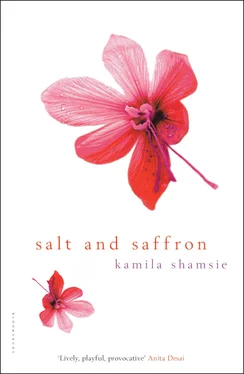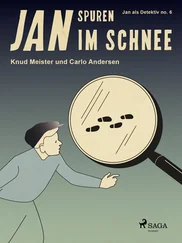It wasn’t just toddlers, of course. Virtually everyone in the family had a favourite theory about Mariam’s silence, long before she became our official black sheep. My father’s theory was among the most succinct. ‘She’s taking the notion of a woman’s traditional role a little too literally,’ he had said after one of his attempts to get her to talk about her early life. Mariam Apa had smiled and walked towards the kitchen, from where I heard ‘biryani’ just before the door swung closed.
But my mother had laughed at my father’s explanation, and reminded me of Mariam Apa’s encounter with Dr Tahir.
I was very young when that happened. It was winter, and Karachi’s social elite were feverishly getting married and throwing parties before the hot weather and riots and curfew returned and impeded social activity. (Mariam Apa was, incidentally, extremely popular in the social milieu, praised for being discreet, a good listener and never interrupting anyone’s flow of loquaciousness.)
My parents and Mariam Apa were at a party, the last of their social stops for the evening. Mariam Apa was draped in a sari that was covered in intricate sequinned designs. As she and my mother wandered to the buffet table, a liveried bearer tripped on the uneven ground and sent a dozen glasses of pomegranate juice crashing to the floor, splattering Mariam Apa’s sari with red blots.
‘Oh, too bad,’ a male voice exclaimed, and she turned to see Dr Tahir — the man infamous for diagnosing mosquito bites as measles bumps — standing behind her. ‘Well, you’ll never wear that again,’ he said cheerfully. ‘That’s the problem with these fancy sequinned clothes. Can’t wash them. I always say that if you want proof that men are more practical than women you should go compare their clothes.’
Mariam Apa did not sleep that night. She sat in the TV room and unstitched every single sequin in the area around the stained section of the sari. When I woke up to get ready for school she was in the bathroom handwashing the sari. And when I returned home that afternoon she had just finished stitching back every sequin in its original place. That night she did the unthinkable and rewore the sari to a dinner where she knew she would see Dr Tahir.
‘So you see,’ my mother told me, ‘she has this, I don’t know, determination, stubbornness, whatever, that allows her to do things that most people wouldn’t. For all we know she’s like this because she lost a bet long ago, and someone said she would never be able to stick to the winner’s terms.’
I never found out which of my parents was right, or if they were both as far from the truth as Usman. To be quite honest, I didn’t really care.
It was enough for me to sleep curled beside her in the afternoons, our heads sharing the same pillow; enough to watch her fingers rise, curl, tap, fall as she listened to Beethoven played or Ghalib sung; enough to know she was watching me as I did my homework, watching me for the simple reason that I was not invisible in her world. And enough to eat the meals she ordered.
My enjoyment of summer holidays abroad, in London or Paris, was always tempered by two factors: the absence of Mariam Apa and the absence of Masood’s food. We always tried to persuade Mariam to come with us but a simple lift of the eyebrow was all it took for her to remind us that she wouldn’t be able to eat anything. One summer, when he was feeling particularly flush, Aba offered to buy a plane ticket for Masood. It was the only time I saw Masood exhibit anything approaching anger. He stood up straight and said that, of course, he was just a servant, he would cook in whichever kitchen we wanted him to cook in, even if it was in a country where he knew no one and couldn’t speak the language. Aba never broached the issue again.
Well, of course I’ve wondered what went on in those weeks when Masood and Mariam were alone in the house.
I always used to imagine that they used that time to cook together. Maybe they did. Early in the morning, before friends and relatives dropped in. I can see them both in the early morning light as they slide the skins off scalded tomatoes, unzip the casing of pea-pods, pour golden oil into a sizzling pan.
I should have invited Khaleel up for dinner.
Just seconds after that thought entered my head, Wasim brought a pile of letters into the room along with my morning tea. There was a letter for me. Mailed in London. My heart thudded so violently against my ribs it must have ricocheted back into my spine.
The letter was from Rehana Apa.
Dear Aliya,
My cousin for whom my degree of affection must prove that blood and water rule. I’ve been thinking a great deal of our conversation in the park, and have extracted from Baji the confession that she didn’t really believe that you would take the myth of not-quites seriously. It’s important you know this so that you know she wanted only to surprise you with the family tree, not to set you wondering how you, and Mariam, will bring down the family. She was stunned when I said I, too, believe there is something to the old legend. She’s quite sure, you see, that the story of not-quites is a self-fulfilling prophecy, or a tool used to others’ ends. Like Taj, the midwife, whose quest for revenge may have led her to say the brothers were not-quites when really they were plain and simple triplets. I do believe the not-quites are special. But does that mean (putting aside the question of whether you and Mariam are qualified to enter their ranks) they always trail destruction? Remember Zain and Ibrahim?
But here my eyes scanned ahead and caught the word on the next line which emptied my mind of everything that had gone before.
Remember that photograph of Bahadur Shah which you mentioned to Khaleel (Samia and I ran into him when we were having tea together at a café round the corner from your flat. Samia introduced us and then had to take off, so Khaleel and I had a very pleasant time talking about how we both know you so little and yet think of you so much and also think so much of you. He’s really quite delicious. I’ve invited him over to meet Baji. Samia will be there, too — I’m sure she’ll report all).
Write to me.
Love,
Rehana Apa.
P.S. The photograph is from Baji. As a token of apology, though she won’t admit that.
I looked at the postmark on the letter. Only four days ago. Why didn’t she say if Khaleel was planning to come to Karachi? The café round the corner. That had to be the one we’d been to together. Surely it wasn’t just coincidence that had brought him there again. Liaquatabad had to be a lie. He’d said it just to test me. He’d talk to Baji and Samia for just a few minutes before they’d ferret out names of his relatives who were known to our family, either pre- or post-Partition. Maybe it would turn out he was somehow distantly related to us.
Damn.
I looked at the letter again, the flat of my hand hovering slightly above the paper to block out that part which referred to him without running the risk of smudging his name.
‘Remember Zain and Ibrahim,’ Rehana Apa had written. Zain and Ibrahim? Dadi had a cousin called Zain, but as far as I could remember the only thing noteworthy about him was the absence of his left eyebrow. And who was Ibrahim? I picked up the phone and dialled Dadi’s number. I had never got out of the practice of dialling Dadi’s number. In the past, whenever I was home for the summer, I would dial that familiar configuration of digits, just to allow myself to believe that she would answer the phone and everything would be as it used to be.
This time, for the first time in four years, she did answer. ‘I had a feeling it was you,’ she said. ‘Are you calling about Usman’s piece?’
I picked up the newspaper, which was lying unread beside me. My cousin, Usman, was interning at the newspaper office, and every day the whole family would scan the papers for his name and call each other up to discuss his journalistic strengths and weaknesses. ‘No, which page?’
Читать дальше












